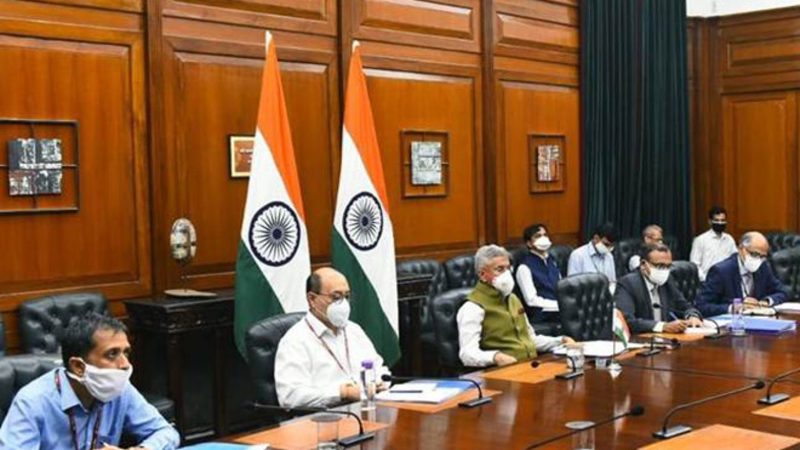BRICS and its future: The challenges of multilateralism / Nivedita Kapoor
Nivedita Kapoor is Junior Fellow with ORF’s Strategic Studies Programme.
The nature of the world order that eventually emerges will determine the future of BRICS and not the other way round.

© ORF, 2020
At the end of April 2020, the BRICS foreign ministers met via video conference in a meeting led by Russian Foreign Minister Sergei Lavrov, in Russia's capacity as the current chair. Quite unsurprisingly, much of the discussion revolved around COVID-19 and the response of BRICS members to it.
At a time when international organisations — from United Nations to G7 to the EU to G20 — have come under fire for failing to mount a collective response to the pandemic, the BRICS foreign ministers meeting once again stressed the importance of a ‘multilateral approach.’ It is no surprise that this approach has been espoused, given that collective action has been the means for BRICS to achieve national interests and increase their say in institutions of global governance.
At the same time, BRICS does not have the ‘strategic vision’ to deal with ‘global matters’ on its own. For this, it relies on other international organisations, like throwing its support behind the G20 when the latter came together to deal with the 2008 financial crisis. Since then, the global situation has undergone significant shifts.
The post-2008 crisis world has been characterised by a sustained backlash against lopsided benefits accrued via globalisation, rise of populism and an increased antipathy towards multilateral dealings by the US — the leading power in several international institutions.
The rise of China and its resultant impact on the world order has raised questions about the impact of a rising power on multilateral processes. The post-2008 crisis world has been characterised by a sustained backlash against lopsided benefits accrued via globalisation, rise of populism and an increased antipathy towards multilateral dealings by the US — the leading power in several international institutions. This has further come under the scanner amid the pandemic as the US leadership — which had been on display during the 2008 crisis and the 2014 Ebola crisis — has been conspicuously missing.
It must be noted that multilateral frameworks were under stress even before the pandemic hit. What the COVID-19 is expected to do is to exacerbate the already prevailing trends when it comes to multilateralism, especially the ones in which the US is a leading member. Having long been used by strong states to further their influence, the post World War II multilateralism had been largely ‘American-centric.’ It is the rise of other powers that are now questioning this arrangement in order to cement their position and derive resultant benefits without alienating the major powers.
But what do these developments mean for multilateral organisations that are not driven by a US membership — how does the post-COVID-19 world order impact their functioning and agenda, seen through the case of BRICS.
What the COVID-19 is expected to do is to exacerbate the already prevailing trends when it comes to multilateralism, especially the ones in which the US is a leading member.
Here, the key will be to focus on two aspects of multilateralism — the impact of any future decline of global international institutions on prospects of BRICS cooperation as well as the internal dynamics of BRICS members and what it means for its existence as a multilateral institution in the short to medium term.
Why multilateralism matters for BRICS
For some time now, ‘weaker states’ have sought to set up multilateral institutions ‘suited to their own specific goals and identities,’ removed from the global hegemonic order. Unlike a hegemonic power, emerging powers find it difficult to strike out on their own and hence rely on multilateral institutions to achieve their goals. In a similar vein, for the past decade, BRICS countries have sought to improve coordination of issues of mutual interest. This continued BRICS cooperation has been based on specific calculations made by the member-states in terms of their defined national interests and achievement of foreign policy goals. The main causes include reform of Bretton Woods institutions, enhance regional power of individual member states, help in achievement of foreign policy goals of individual member states as well as increase cooperation with the rising power to ‘bind’ it among formal institutional structures.
This has led to annual summit meetings of the heads of state, establishment of the New Development Bank, setting up of the Contingency Reserve Arrangement — as some of the key achievements — with the NDB receiving ‘AA+ long-term issuer credit ratings from S&P and Fitch and AAA foreign currency long-term issuer rating from Japan Credit Rating Agency (JCR).’ Also, the countries have made a collective demand for reform of global financial institutions and even coordinated positions at the G20 summit. In fact, ‘strengthening and reforming the multilateral system’ remains a key principle of cooperation among BRICS, as is evident from the 2019 Brasilia summit declaration. This highlights not just overlapping concerns among BRICS countries, but also the extent to which cooperation is based on activities of other multilateral institutions. Given that BRICS countries on their own are not in a position to mount global efforts to deal with large-scale crisis, a paralysis at the level of other multilateral institutions negatively affects agenda formation in BRICS. This takes place through an undermining of the strategic calculation that had led member states to cooperate within the BRICS framework to achieve the benefits accrued through a collective approach in international organisations.
Read more in the source: https://www.orfonline.org/expert-speak/brics-future-challenges-multilateralism-66053/


